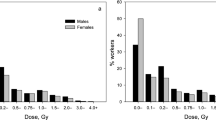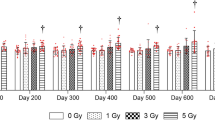Abstract
A DOSE of radiation above the accepted tolerance limit of 0·5–1 roentgen per week presents hazards to the individual, notably those of sterility and cancer, and to his progeny—in the form of recessive mutations. The importance of the former effects has been recognized since the beginning of the century mainly as a result of the all too obvious injury to many of the early workers with radium and X-rays. The medical profession is therefore fully alive to these dangers. On the other hand, whereas the practitioner sees many examples of the effects of recessive mutations in man—the amaurotic familial idiot, the haemophiliac, the alcaptonuric—he is seldom, if ever, able clearly to relate these to radiation effects. Thus the matter of genetic damage stands outside the field of practical medicine, and indeed so far has been largely a theoretical concern of eugenics.
This is a preview of subscription content, access via your institution
Access options
Subscribe to this journal
Receive 51 print issues and online access
$199.00 per year
only $3.90 per issue
Buy this article
- Purchase on Springer Link
- Instant access to full article PDF
Prices may be subject to local taxes which are calculated during checkout
Similar content being viewed by others
Rights and permissions
About this article
Cite this article
MCFARLANE, A. Radiations and Health. Nature 162, 480–481 (1948). https://doi.org/10.1038/162480a0
Issue Date:
DOI: https://doi.org/10.1038/162480a0
This article is cited by
Comments
By submitting a comment you agree to abide by our Terms and Community Guidelines. If you find something abusive or that does not comply with our terms or guidelines please flag it as inappropriate.



